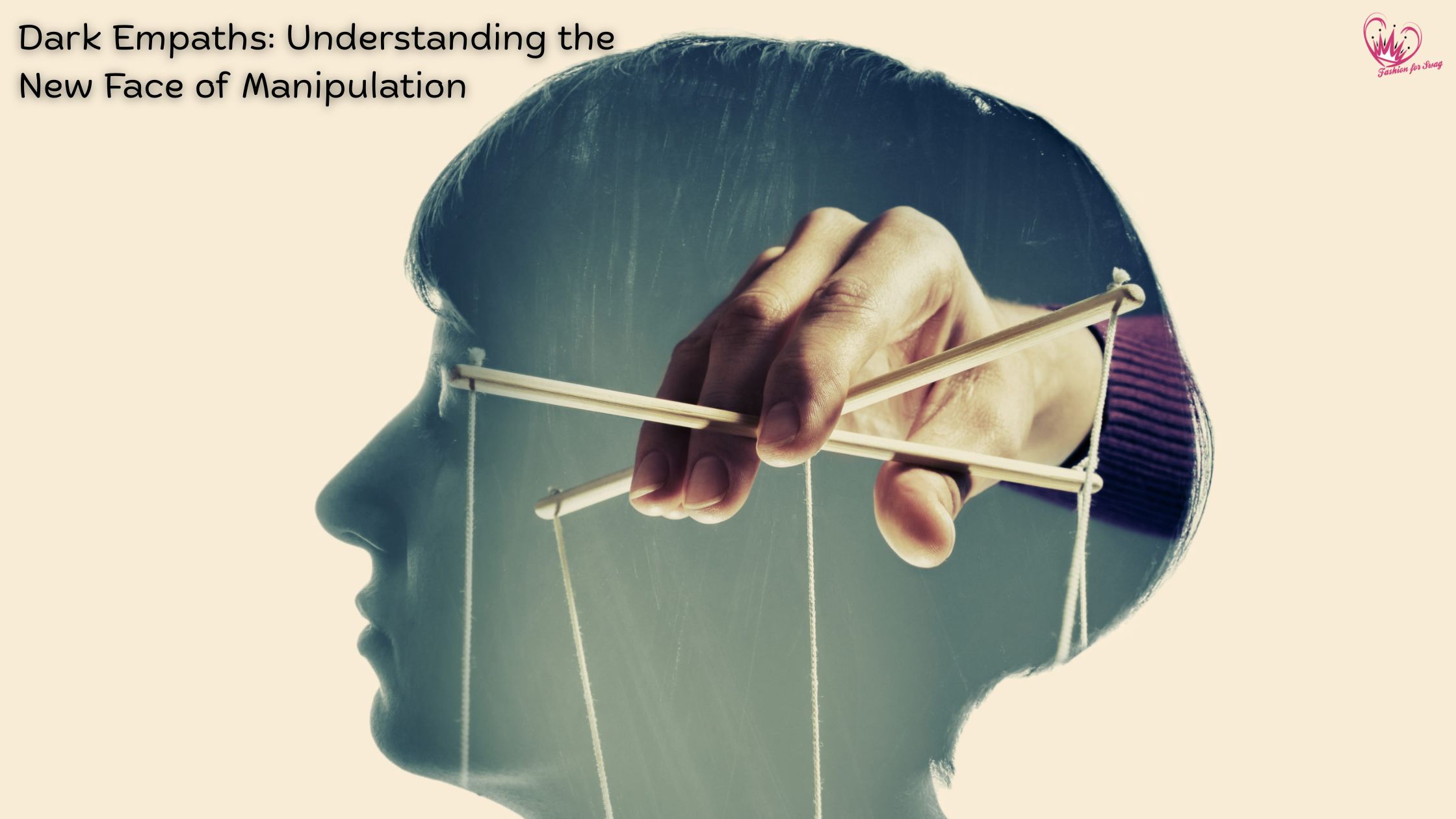
Dark Empaths: Understanding the New Face of Manipulation
Imagine a person who understands your private emotions, your most hidden vulnerabilities, your greatest hopes… Only to apply them against you. This isn’t always the bloodless, obvious manipulation of a traditional villain, however something a way greater insidious. Welcome to the puzzling and threatening world of the Dark Empath. This rising character type combines a eager empathetic information with darker new face of manipulation, more self-serving traits, creating uniquely subtle and devastating manipulators who’re distinctly tough to spot.
Recognizing the symptoms and knowledge the insidious procedures of darkish empaths is consequently important for defensive your emotional and psychological wellness in present day an increasing number of complex interpersonal landscape. In this text, we’re going to delve into what defines a dark empath, why their strategies are so effective and dangerous, a way to pick out them, and most significantly, how to shield yourself from their have an effect on.
What is an Empath? (The Foundation)
Before diving into the “darkish” facet, it’s critical to apprehend the middle concept: empathy.
Empathy is normally defined as the potential to understand and share the emotions of any other. It permits us to connect deeply with others’ reports and views.
Psychologists frequently differentiate between 3 foremost sorts of empathy:
- Cognitive Empathy: This is the intellectual potential to understand what someone else is feeling and wondering, like reading their emotional cues.
- Emotional Empathy (or Affective Empathy): This entails truly feeling what every other character feels, almost as if their feelings are contagious.
- Compassionate Empathy: This is going beyond information and feeling; it is being moved with the aid of someone’s misery and having the desire to assist them.
Fundamentally, empathy is sort of universally regarded as a effective and prosocial trait, fostering connection and mutual help.
The “Dark” Component: A Glimpse into the Dark Triad
To recognize the dark empath, we need to first comment on the “Dark Triad” – a cluster of three personality traits often observed collectively and associated with undesirable interpersonal behaviors:
- Narcissism: Characterized by grandiosity, a pervasive experience of entitlement, and a profound belief in a single’s personal superiority.
- Machiavellianism: Involves foxy, strategic manipulation, and a realistic brush aside for ethical or ethical concerns to reap personal goals.
- Psychopathy: Marked through an excessive loss of emotional empathy, impulsivity, superficial appeal, and delinquent conduct.
The vital point here, and the center of the paradox, is that these Dark Triad tendencies are generally described by means of a large deficit in authentic empathy, making the concept of an “empath” possessing them so exciting and, certainly, unsettling.
The Emergence of the “Dark Empath”: The Unholy Alliance
This brings us to the difficult and strong aggregate: the “Dark Empath.”
- Synthesizing the principles: A dark empath essentially combines a excessive degree of cognitive empathy – the highbrow capacity to recognize what others are feeling and why – with underlying Dark Triad personality tendencies (narcissism, Machiavellianism, or psychopathy).
- The center difference: Unlike a true empath who studies emotional resonance and feels with you, a dark empath’s understanding is often analytical. They grasp your emotional country and its triggers; however, this insight is wielded as a device for personal gain, control, or dominance, in preference to for real connection, comfort, or compassion.
- Why they’re wonderful from pure narcissists/psychopaths: They do not necessarily show off the profound loss of emotional capability or complete absence of regret seen in natural psychopaths, nor do they continually require constant admiration like a textbook narcissist. Instead, their empathy is instrumental – it serves a calculated, self-serving purpose, making their manipulations a long way greater nuanced and hard to locate.
- Initial research & popularization: The time period received big traction following a 2020 look at with the aid of researchers led by Heym et al., which explored individuals displaying each empathy and darkish developments, bringing this charming but unsettling character profile into the mainstream psychological and public discourse.
Characteristics and Behaviors of a Dark Empath
Spotting a Dark Empath can be tough precisely due to the fact their manipulative techniques are cloaked in a veneer of knowledge. Here are key characteristics and behaviors to observe for:
- Surface-degree Charm and Charisma: Dark Empaths are often incredibly attractive, possessing a natural air of secrecy that draws human beings in. They are skilled conversationalists who can appear rather relatable, making you experience right away snug and understood.
- Mirroring Emotions for Manipulation: Their cognitive empathy allows them to expertly replicate your feelings and stories back to you. This makes you sense profoundly understood and validated, but it is a calculated pass designed to build rapport, after which they subtly manual you toward their desired outcome or viewpoint.
- Strategic Kindness and Seemingly Genuine Concern: Their acts of kindness are hardly ever spontaneous or virtually altruistic. Instead, they’re calculated investments, designed to construct consider, create a feel of duty, or function themselves favorably for future manipulation. The subject they show is an overall performance.
- Gaslighting and Subtle Emotional Invalidation: A hallmark behavior, they will subtly twist your phrases, deny occasions that honestly passed off, or make you doubt your very own perceptions and feelings. This is regularly done with an air of “challenge” to your mental kingdom (“Are you certain you do not forget that successfully? You seem a piece pressured lately.”), subtly undermining your fact.
- Playing the Victim or Martyr: They are masters at evoking sympathy. They skillfully painting themselves as misunderstood, unfairly targeted, or continuously suffering to avoid obligation, gain favors, or manipulate narratives, turning each situation into one in which they’re the beleaguered hero or unfortunate sufferer.
- Using Vulnerabilities Against Others: Once they’ve gained your accept as true with and perception into your fears, insecurities, goals, or beyond traumas, they may subtly, but ruthlessly, take advantage of these vulnerabilities for his or her own schedule, knowing exactly a way to push your buttons.
- Difficulty with True Intimacy: Despite their obvious information, their connections stay superficial.8 Their hobby is in what they are able to advantage, now not in authentic emotional bonding. They conflict with reciprocal vulnerability and real, selfless care.
- Pattern of Emotional Exploitation: Over time, a clear and regular pattern emerges in which your emotional power, sources, or average well-being are repeatedly depleted for his or her gain, leaving you feeling drained and pressured.
Why Dark Empaths Are So Dangerous (and Hard to Spot)
The danger of a Dark Empath lies precisely of their misleading nature, making them fantastically difficult to become aware of until sizable emotional damage has befallen.
- Their Empathy Makes Them Seem “Safe”: This is their maximum amazing and deceptive weapon. Unlike the openly bloodless or uncaring demean or regularly associated with conventional dark personalities like psychopaths, Dark Empaths present as expertise, compassionate, and relatable. This makes human beings drop their shield, constructing a fake experience of protection that is then expertly exploited.
- Anticipate Reactions: Their especially advanced cognitive empathy offers them a nearly uncanny ability to are expecting how you will react to their manipulation. This lets in them to calibrate their approaches with surgical precision, knowing precisely what to mention or do to obtain their preferred final results even as minimizing resistance or suspicion.
- Exploitation of Trust and Emotional Bonds: They do not simply manage; they leverage the very bonds of believe and emotional closeness they’ve carefully cultivated. This makes the eventual betrayal experience far deeper, extra personal, and profoundly perplexing for the sufferer.
- Victims Feel Confused, Guilty, and Self-Blaming: Because the manipulator seems so “knowledge” and seemingly caring, victims often internalize the blame. They doubt their own judgment, question their sanity, or sense sizeable guilt for even suspecting a person who seems so absolutely worried approximately them.
- The “Warm” Facade Hides Cold Calculation: Their outwardly heat and empathetic demeanor is a sophisticated mask. Beneath it lies a deeply pragmatic, often ruthless, and self-serving power for manipulate, electricity, or private advantage. This stark contrast between their presentation and their true purpose is what makes them so uniquely risky.
How to Identify a Dark Empath (Practical Signs)
Given their deceptive nature, identifying a Dark Empath requires shifting past first impressions and scrutinizing styles of conduct.
- Look Beyond the Surface Charm: Their preliminary aura may be charming. Don’t be swayed with the aid of their appeal on my own. Instead, prioritize watching their steady movements and their effect on you over a sustained length.
- Observe Inconsistencies Between Words and Actions: This is a crucial pink flag. Do their “being concerned” phrases and empathetic pronouncements absolutely align with their actual conduct? Do their actions continuously aid your properly-being, or do they contradict their verbal assurances?
- Pay Attention to How They Respond to Your Pain: When you express vulnerability or distress, is their “empathy” surely supportive? Or does it subtly shift to making the state of affairs about them, subtly invalidating your emotions, or supplying unhelpful “advice” that serves their agenda? Does your ache appear to provide them a diffused satisfaction or a gap for manipulation?
- Trust Your Gut Feeling: This cannot be overstressed. If you always feel tired, stressed, used, or emotionally exhausted after interactions with a person, in spite of their outwardly “high-quality” or “understanding” demeanor, your instinct is probable looking to alert you.
- Are They Overly Interested in Your Weaknesses or Secrets? Dark Empaths frequently probe deeply on your vulnerabilities, fears, past traumas, or private facts. This isn’t always out of true subject that will help you heal, but to gather leverage for destiny manipulation.
- Do They Use Your Emotions to Control Situations? Notice in the event that they subtly play for your guilt, fear, preference to delight, or even your compassion to get what they need. They know precisely which emotional buttons to push.
- Pattern of Self-Serving Behavior: Despite occasional “empathetic” gestures or acts of kindness, a clean and recurring pattern will emerge in which their movements in the long run lead to their gain, regularly at your direct price or through the exploitation of others round them.
Protecting Yourself from Dark Empaths (Strategies)
Safeguarding your emotional and mental nicely-being from a Dark Empath calls for aware attempt and strategic implementation of obstacles.
- Set Firm Boundaries and Enforce Them: This is paramount. Learn to say “no” assertively and stick to it, even when they hire charm, guilt-tripping, or feigned hurt to control you. Consistency is fundamental.
- Practice Emotional Detachment: Resist getting drawn into their dramatic narratives or extreme emotional displays. Observe their behavior from a essential distance, recognizing that their “empathy” is mostly a overall performance designed to elicit a response from you.
- Limit Personal Information Sharing: Be exceedingly cautious approximately revealing deep vulnerabilities, secrets, or sensitive facts, specifically early on. Wait till genuine, reciprocal trust has been hooked up over a big length.
- Document Interactions (if essential): For extreme and persistent manipulation, or if you anticipate wanting professional or legal intervention, keeping a real record of manipulative incidents, conversations, or guarantees can be useful for readability and validation.
- Seek External Perspectives: Talk to trusted buddies, circle of relative’s members, or a therapist. An goal, outdoor perspective let you see patterns of manipulation that you is probably too close or emotionally entangled to understand truly.
- Prioritize Your Mental and Emotional Well-being: Pay close interest to the way you sense after interacting with them. If a courting always leaves you feeling drained, confused, disturbing, or invalidated, it is a definitive signal to step back and re-evaluate its vicinity for your existence.
- Consider Professional Help: A therapist that specialize in narcissistic abuse or manipulative relationships can offer a safe space to system the manipulation, assist you rebuild self-esteem, and expand strong coping mechanisms. For deeply entangled conditions, they can provide steerage on disengagement and recuperation.
Conclusion
The concept of the Dark Empath famous a sophisticated and regularly insidious form of emotional manipulation. By combining authentic cognitive empathy with the self-serving characteristics of the Dark Triad, they grow to be grasp manipulators who’re distinctly tough to identify, blurring the lines among care and control. However, focus is your first and strongest line of protection. Knowing their signs and symptoms and processes empowers you to recognize these styles. We urge you to agree with your instinct, set firm boundaries, and prioritize your mental and emotional health principally else. Remember, proper connection flourishes on true empathy, mutual appreciate, and reciprocal vulnerability, no longer calculated expertise for manipulation. Safeguard your emotional space for actual relationships that clearly enrich your lifestyles.



